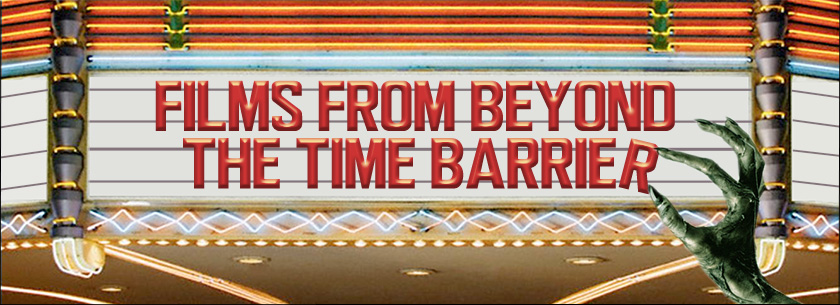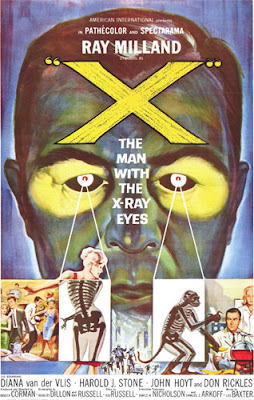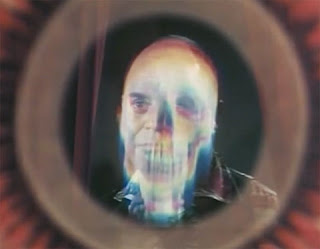Now Playing: Dead Men Walk (1943)
Pros: George Zucco and George Zucco (playing dual roles); Some good theatrical moments
Cons: Too much talk and not enough walk; Beautiful Mary Carlisle and underrated Dwight Frye are wasted in typed roles; Younger male lead is as stiff as a day-old corpse
Pros: George Zucco and George Zucco (playing dual roles); Some good theatrical moments
Cons: Too much talk and not enough walk; Beautiful Mary Carlisle and underrated Dwight Frye are wasted in typed roles; Younger male lead is as stiff as a day-old corpse
I haven't been feeling like my old self lately. I'm lethargic much of the time, I don't feel like eating much, and despite the fact that I live in one of the sunnier climes in the whole country, I have the pallor of a workaholic mortician. I also have trouble sleeping. As the cold rays of the moon stream through my window and the leaves rustle in the night breeze, I dream of large, black shapes hovering outside, tapping, then scratching at the screens, begging me to let them in. I wake up in a cold sweat, listening, scarcely daring to breathe. After what seems like hours, I slowly, carefully lay my head back down to try to catch a few more minutes of fitful sleep.
Just this morning I applied a bandaid to a couple of angry-red marks on my neck. (Okay, so I cut myself shaving-- have you seen how expensive razor blades are these days? I like to make sure mine are good and done before they go in the trash can!) No, my problem isn't vampires -- if only it were that simple! My problem is another type of bloodsucker, the Great Vampiric Marketer Americanus, a foul, relentless creature who will stop at nothing, pursuing its prey to the ends of the earth, to extract every last discretionary cent out its target's wallet and bank account.
Since embarking on my epic move to a new city, I've canceled some services and picked up others. Little did I know that there is an unwritten rule (no doubt soon to become a law) that once you sign up with DirecTV, you can't leave. I learned the rule the hard way after a solid week of two, sometimes three calls a day from agitated DirecTV customer reps demanding to know why I had dropped their service. My protests that I was not a DirecTV number, that I was a free man, capable of making his own decisions, fell on deaf ears. (For more on this fiasco, see my post on Fabulous, Fantastic TV Shows of the Fifties.) On the flip side, I picked up a different internet service in my new home city. Little did I know that there was an unwritten rule that you can't just sign up for internet-- you have to bundle it with a TV package (preferably with premium movie and sports channels) and digital phone service. Now I'm getting calls from the new service's reps wondering when I'm going to do my civic duty and bundle up.
 |
| Is that a DirecTV salesman's face at my window, or just a vampire's? |
By contrast, Dr. Lloyd Clayton's problems in Dead Men Walk -- dealing with an identical twin, devil-worshiping brother who has come back from the dead as a vampire -- seem positively mundane. Still, Dead Men Walk is worth a look, if only because it offers a double dose of the incomparable B-movie villain George Zucco.
After a somewhat surreal introduction to "the dark-enshrouded regions of evil" by a disembodied head floating above the flames in a fireplace (more on that later), Dead Men begins appropriately enough with a funeral. When the pastor concludes the service by inviting the mourners to pay their last respects to the deceased in the open coffin, only one, Dr. Lloyd Clayton (George Zucco) stands up. He gazes solemnly down at… his own face in the form of identical twin brother Elwyn! His reverie is interrupted by an older woman (Fern Emmett) who has quietly entered the chapel. "How can you defile this sacred house with the body of that evil man, that servant of the devil!" she cries. As she's whisked away, the pastor apologizes to Lloyd: "Poor old Kate hasn't been quite right since the shocking death of her little grand-daughter last year."
At the family mausoleum, Lloyd discusses the deceased twin brother with his niece Gayle (Mary Carlisle) and her beau, young Dr. David Bentley (Nedrick Young): "He always seemed an alien soul, even in childhood. I think he hated me all his life. After he returned from India, Elwyn was like a man obsessed (sic) by a demon, nothing was sacred to him…" (Mamas, don't let your babies grow up to muck around in arcane Eastern religions and practices!)
 |
| Dwight Frye plays yet another demented assistant. Sadly, this would be one of his last films. |
Cut to lovebirds Gayle and David, who've decided to get married. Clayton gives them his warm approval, but the lightheartedness doesn't last long. Zolarr is busy extricating his master Elwyn's coffin from the mausoleum, wheeling it to a deserted part of the cemetery. Elwyn slowly rises, classic style, from the satin-lined coffin. "I am not yet strong," he tells the open-mouthed Zolarr, "but I have been given the power to draw ever-lasting life from the veins of the living…" (Apparently Elwyn put all those books and papers to good use before his brother burned them.)
The living dead Elwyn wastes no time drawing blood from a local woman. In the light of day, Lloyd and the town sheriff (Hal Price) investigate the fatality. The doctor observes two puncture marks on her neck, and the fact that she appears to have bled to death. Old Kate, who seems to be everywhere, steals into the bedroom and announces that she knows how the woman died. She blames Lloyd's evil twin. "He's dead Kate, and his evil died with him," he assures her. "But it didn't die, it's growing stronger every day!" she protests. The sheriff runs her off, threatening to have her locked up.
That night, Lloyd is astonished to find out that Kate is right when Elwyn's spectre confronts him in his study. "Am I losing my mind? There was no sign of life in Elwyn's body when it was placed in the vault!" he says to himself, hardly believing what he's seeing. "You'll know that I'm no intangible figment of your imagination when you feel the weight of my hatred," responds the walking dead man. "Your life will be a torment. I'll strip you of everything you hold dear before I drag you down to a sordid death!" Elwyn walks over to the window, looking out at Gayle and David holding hands in the garden. "I'll take life from Gayle," he cackles, "slowly, you'll see her life ebb day by day… and you'll be powerless to save her!" Lloyd has had enough. He grabs a pistol from his desk and empties it into the smirking phantom. Elwyn laughs maniacally and then vanishes.
 |
| Split screen shot of evil Elwyn confronting his twin brother. "I'll strip you of everything you hold dear before I drag you down to a sordid death!" |
Elwyn makes good on his promise to drain the life out of Gayle. That night, a shadow hovers over Gayle as she tosses and turns in fitful sleep. Talking to himself before he leans down to sink his teeth in her neck, Elwyn reveals his plan to turn her into one of the undead like himself, to be his servant for all time.
Perhaps because he still can't quite believe what happened in the study, Lloyd has taken no precautions to keep his niece safe. But in the cold light of day, the evidence is undeniable. Something is afflicting her, and she's growing steadily weaker. The symptoms suggest an acute case of anemia. And then there are the bite marks on her neck, and Gayle's reports of terrible dreams, in which a huge bat-like creature hovers over her bed. Duh! The doctors decide to give her a transfusion, with the concerned fiance donating the blood. As they're wrapping up the procedure in Gayle's room, Lloyd turns around to see his evil twin's face hovering at the second story window! Elwyn vanishes before David can see it.
In Lloyd's study, the older doctor tries to tell David that Elwyn is behind Gayle's mysterious illness, but the rational younger doctor is having none of it: "the dead have no power over the living," he huffs. Lloyd convinces the reluctant doctor to visit Elwyn's crypt to see the state of the body-- if there's no decomposition, it will be further proof of Elwyn's vampiric existence. They discover that the coffin and body are gone. Ever the rationalist, David guesses that medical students stole it, but Lloyd knows better. At this point David thinks that Lloyd is seriously off his rocker. He proposes marrying Gayle immediately and taking her away. Clayton says he'll think it over.
 |
| Elwyn and Zolarr plot further mischief by candlelight. |
When the nosy Kate discovers Elwyn's new resting place, Zolarr kills her for her troubles. A local tells the rest of the town that he's seen Dr. Clayton skulking around at night, and the "leading citizens" -- who look like a disorganized assemblage of Gabby Hayes impersonators -- start grumbling about taking the law into their own hands. David, who by now has met the real, undead Elwyn, tries to convince them that gentle Lloyd is not the culprit. The good doctor has a tall order on his hands: convince the townies that his evil twin is really responsible for the murders before they string him up, send Elwyn back to the dark pits from whence he came, and save his beautiful niece from a fate worse than death.
This low-budget, low-energy horror film from the lowly poverty row studio PRC seems like a celluloid Rip Van Winkle that fell asleep in 1933 and woke up ten years later. It plays out as an almost straight, shoestring retelling of Browning's 1931 Dracula, with Lloyd as Van Helsing, Elwyn as Dracula, Gayle as Mina, fiance David as Harker, and Zolarr standing in as a combination Renfield and Fritz from Universal's original Frankenstein (1931). It even takes a minute or two out of a very short 64 minute running time to have Elwyn explain to his mouth-breathing assistant all about how he must rest in his coffin during the day, how he will sustain his immortal life on the blood of the living, etc., as if moviegoers had never heard of vampires or the rules of their game. Considering that in 1943 Universal introduced the Son of Dracula and set up a meeting between Frankenstein and the Wolf Man, and that RKO released three of Val Lewton's frighteningly good B horrors (I Walked with a Zombie, The Seventh Victim and The Leopard Man), Dead Men Walk seems all the more quaint and anachronistic.
 |
| Gayle (Mary Carlisle) looks absolutely fabulous as she gets a blood transfusion in the comfort of her boudoir. |
There was in the latter years of his life a lot of discouragement. He'd gotten, unfortunately, into this mold of playing horror characters with lots of makeup or playing Nazis during the war or playing gangsters in the mid-1930s. He got typed and not until just before he died did he have the possibility of breaking out of type… The unfortunate and ironic thing was that when he was in New York originally from 1922 to 1928, he was a big star on the stage playing musicals, comedies and all kinds of light stuff. The moment he went to California that all stopped and he never got the chance to do that sort of thing again. [According to Frye's Wikipedia entry, the break out was to be a role in the A-list picture Wilson, based on the life of president Woodrow Wilson. Frye died of a heart attack just a few days before he was to report to the set.]
 |
| George Zucco serves up a generous portion of ham as the mad, evil Elwyn. |
We get a taste of the melodramatic language to come with an unusual introduction featuring a hand grabbing a book titled "A History of Vampires" and tossing it into a burning fireplace (a foreshadowing of Lloyd's burning of his twin's blasphemous occult library). An eerie floating head then appears superimposed over the fire, challenging the audience:
"You creatures of the light, how can you say with absolute certainty what does or does not dwell in the limitless ocean of the night? Are the dark-enshrouded regions of evil nothing but figments of the imagination because you and your puny conceit say they cannot exist?"
 |
| These two sinister floating heads both debuted in 1943 to introduce B movie chillers. (Universal's Inner Sanctum series on the left, Dead Men Walk on the right.) |
Where to find it:
Amazon Instant Video
Oldies.com
"Whence came a story, told in frightened whispers, down through the ages... of witch and warlock, werewolf and vampire, and all the spawn of Hell! "







